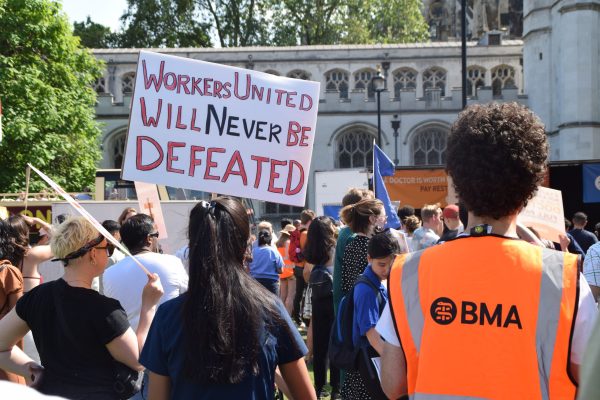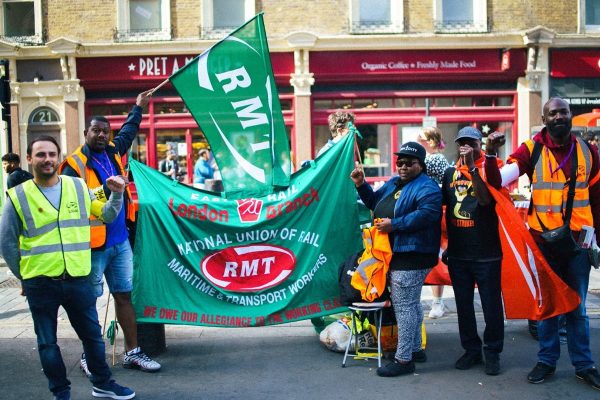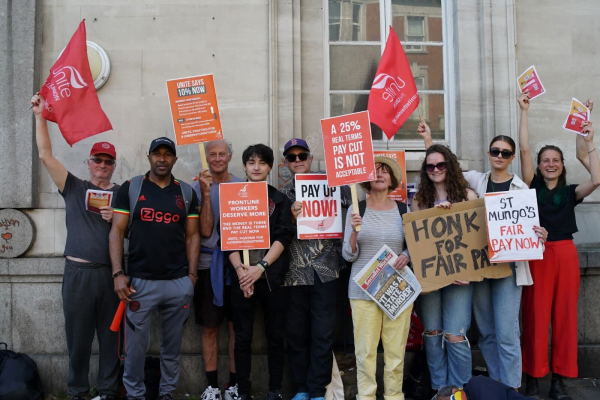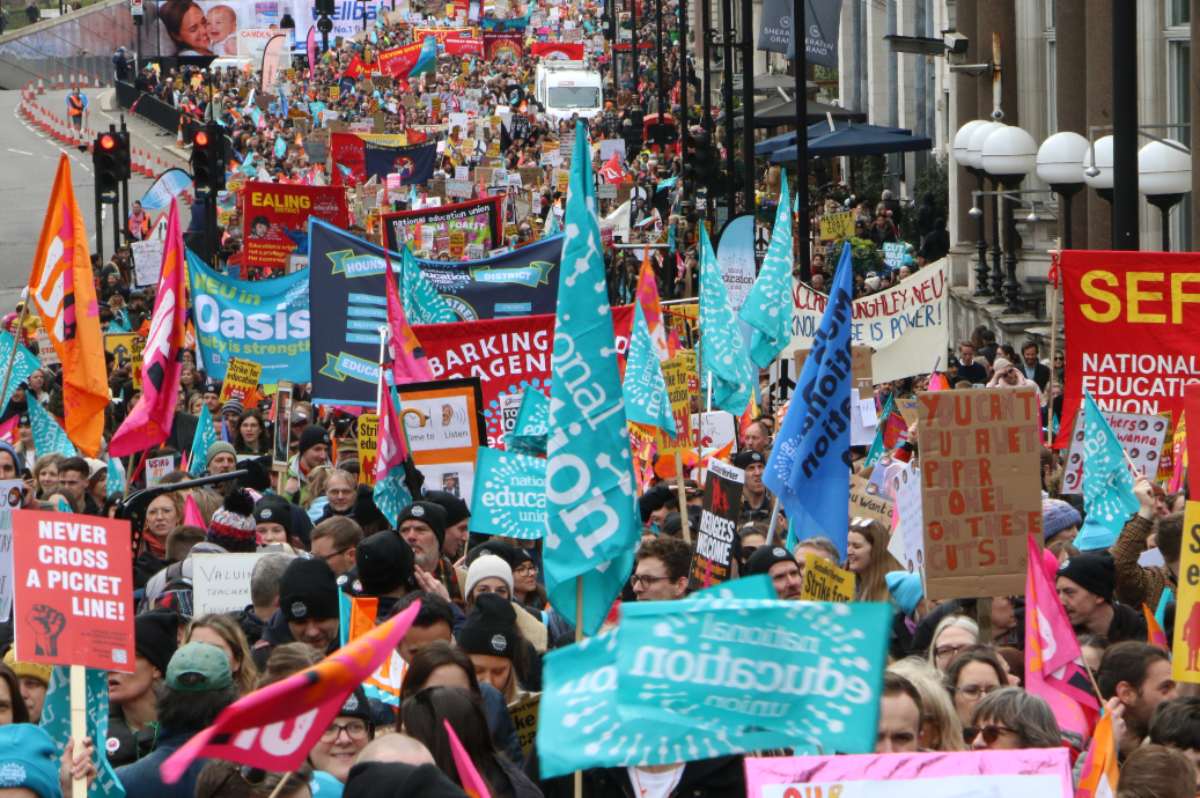The cost-of-living crisis is here to stay. The latest news that inflation is stuck at 8.7% will not come as a shock to workers, who can feel the pinch of rising prices with every purchase. This is especially the case with food prices, for example, which are soaring at a rate of almost 20%.
Prime Minister Rishi Sunak has cynically used this as an opportunity to rule out pay rises for the public sector, signalling a tougher approach from the government against the unions.
In a patronising tone, the Tory PM asserted that providing workers with a real wage increase would simply be a case of “giving with one hand” and “taking with the other” by fuelling inflation.
Instead, panicking bourgeois economists are advising the ruling class and its representatives to trigger a recession by hiking up interest rates, in order to tame inflation.
The result will be bankruptcies and rising unemployment. Such a scenario would spell disaster for workers.
Either way, whether it’s the gradual suffocation of inflation or the sharp shock of recession, it is the working class who will be made to pay for this latest crisis of capitalism.
Stonewalling
In the face of these attacks, however, the working class is not sitting back passively. Instead, workers across the board are moving forward and asserting their interests through strikes and struggle.
This is increasingly forcing the bosses and the Tories to make a choice: provide pay rises to try and buy a temporary peace today; or sit out the strikes and stonewall the unions, whatever the consequences for tomorrow.
Some of the national disputes that have been raging since the start of the year have slowed, as the unions enter negotiations and consider deals. This is the case for the struggles involving the CWU and PCS, at Royal Mail and in the civil service, respectively.
At the same time, there are many others who are continuing to fight. And there are yet more heavy battalions of the workers’ movement bringing up the rear.
In fact, July will see a number of big national strikes. And with the Tories increasingly digging their heels in, everything indicates that Britain is heading for another long, hot strike summer.
To win, trade unionists must fully absorb the lessons provided by struggles past and present.
Teachers
Despite the school year drawing to a close, the NEU is going out once again. On 5 and 7 July, schools across Britain will be shut down, as teachers continue their fight for a real pay rise.
 Despite the intransigence presented publicly on the question of pay by Tory education minister Gillian Keegan, government sources are making noises about a 6.5% offer. And the NEU leadership seems to be suggesting that they could recommend acceptance of such a deal.
Despite the intransigence presented publicly on the question of pay by Tory education minister Gillian Keegan, government sources are making noises about a 6.5% offer. And the NEU leadership seems to be suggesting that they could recommend acceptance of such a deal.
The situation remains uncertain, with some in the union’s leadership pushing for continued action.
What we can say is that accepting such an offer would be a mistake. The teachers have enormous potential strength, with a high union density and a presence across the country.
At the same time, other education unions – such as NASUWT, NAHT, and ASCL – are currently balloting to strike. If these votes are successful, this would enormously strengthen the hand of the teachers, laying the basis for coordinated action across the sector.
A reballot of NEU members is currently taking place, until 28 July. Members should vote ‘Yes’ to further action, and use upcoming picket lines as a platform to strengthen and broaden the struggle.
This should include the organisation of strike committees in every school, involving colleagues in other unions, parents, and students.
Not only would this terrify the Tories, but it would also make clear to the union leaders that teachers are determined to keep fighting.
NHS
Junior doctors in the BMA are also, so far, committing to their fight for full pay restoration. Off the back of strike action in June, they are set to go out for five days straight in July – the longest action of its kind to ever hit the NHS. Such militancy is to be welcomed.
This time they will be joined by NHS consultants, who have just voted to walk out, for the first time in over 50 years. These senior doctors, also organised in the BMA, will be striking on 20 and 21 July. Once again, the dispute is about falling pay.
The BMA have also indicated that there may be even more sections of their union coming out over the next year, including specialists and family doctors. Clearly, then, the battle in the NHS is far from over.
Unfortunately, however, the doctors will not be joined by their nurse colleagues.
This week, it was announced that the Royal College of Nursing (RCN) narrowly failed to pass their national reballot, due to the Tories’ anti-union laws.
Although 84% of RCN members voted ‘Yes’ to further strike action, the turnout was only 43%, below the legal 50% threshold. This means the union’s dispute will now officially come to an end.
In truth, this disappointing outcome comes down to a question of leadership. While rank-and-file nurses have consistently displayed determination and militancy, RCN general secretary Pat Cullen has always been reluctant to lead the strike.
Cullen went from recommending acceptance of a rotten 5% pay offer to – following a rejection by the rank and file – proposing a national aggregated ballot.
Nurses on the ground reported to Socialist Appeal that this vote was always going to be harder to pass compared with a disaggregated ballot. Indeed, this was potentially a cynical consideration by Cullen and other conservative RCN leaders.
The leadership has consistently conveyed a lack of confidence in the members. And when coupled with an obvious unwillingness to coordinate with other unions, such as the BMA, many nurses no doubt felt they would be isolated in any future strikes.
If a militant lead had been given, and coordinated action and escalation had been put forward as a clear winning strategy, then this could have inspired more members to vote Yes, helping to push the ballot over the line.
BMA members must take heed of these lessons, and ensure that they organise to keep the pressure on their own leadership, so that they do not follow suit.
Rail
The RMT are set to also go out for three days at the end of the month, in their long-running dispute with the train operating companies (TOCs). On 20, 22, and 29 July, Britain’s trains will come to a halt.
This is due to the absence of any offer to negotiate from either the TOCs or the government.
 Even after a year of struggle, members are clearly determined to keep fighting, following a reballot back in May.
Even after a year of struggle, members are clearly determined to keep fighting, following a reballot back in May.
“They voted by 9-1 to renew their strike mandate,” commented union general secretary Mick Lynch in a recent press release. “RMT will continue its industrial campaign until we reach a negotiated settlement on pay, working conditions, and job security.”
The trouble is, the Tories are equally determined to smash the RMT, given its role as a militant union and leading force in the labour movement. This explains the Minimum Service Levels Bill, for example, which is still working its way through Parliament.
The Tories have also thrown down the gauntlet with their proposals for ticket offices to be shut down at stations across the country.
With almost 1,000 offices threatened with closure, and many more jobs under threat, Lynch has stated that the union will use its “full industrial force” to halt the government’s plans.
These fighting words must now be followed with deeds, including escalated strike action.
A key lesson from the last year’s strike wave has been that isolated days of action only serve to exhaust and tire members.
Instead, sustained action is required to push the Tories and the bosses back.
Resistance
The above-mentioned disputes are also just the active national strikes.
On 4 July, a national pay ballot closes for 360,000 local government workers, organised in Unison. Similarly, council workers represented by Unite and GMB are also in dispute with the employers.
If these votes are successful, and the unions move to strike, such action will hit every council and many schools in England and Wales.
And that’s before we speak of the dozens of local or regional strikes taking place: from the oil rigs in the North Sea, to charity workers at St Mungo’s.
There is a widespread and ever-growing resistance spreading rapidly across Britain.
Workers are not only rejecting low pay, poor conditions, and job threats, but are increasingly also seeing that there is a common enemy uniting all these struggles: the Tory government, and the capitalist system it defends.
Many are therefore also drawing the conclusion that they are ‘all in the same boat’: from doctors and council workers, to teachers and rail workers.
The 1 February and 15 March ‘days of action’ helped to forge class unity and generalise these struggles.
But the Tories soon splintered the movement, and the union leaders failed to maintain the momentum.
The lesson is clear: coordinated action is not only the way forward, but must be part of a wider strategy to link the struggles, escalate and broaden the fightback, and build towards a knock-out blow.
Tory attacks
This is especially important given the Tories threats to further restrict workers’ rights with their latest anti-union legislation.
It is welcome that the RMT have announced a national demo to fight back against the Tories’ anti-strike laws.
This is set to take place in October. What is needed between now and then is a cross-union movement, united around a clear set of socialist demands, to beat the bosses once and for all.
This should include: a sliding scale of wages, to increase pay in line with inflation; nationalisation of the major monopolies and banks, without compensation; and workers’ control of industry.
These are the only solutions to the issues facing our class. And this is the bold programme that Socialist Appeal is fighting for.
History teaches us that price caps, below-inflation pay deals, and attempts to kindly persuade the bosses won’t work, and cannot tackle the root of the problem: the crisis-ridden capitalist system.
Instead, more and more workers and youth are learning from the struggle, and are drawing revolutionary conclusions.
Join the communists!
As communists, we follow Marx’s words in the Communist Manifesto, to “fight for the attainment of the immediate aims, for the enforcement of the momentary interests of the working class”.
 You will therefore find us everywhere: on picket lines, leading strikes, and building solidarity on the ground.
You will therefore find us everywhere: on picket lines, leading strikes, and building solidarity on the ground.
But the communists also “in the movement of the present…represent and take care of the future of that movement”.
This means being honest with the working class: that unless we overthrow capitalism, once and for all, then any immediate gains we achieve will only be snatched back from us by the bosses sooner or later.
Overthrowing capitalism and seizing power is a big aim. But it has been done before. And it can be accomplished again.
We take inspiration, therefore, from Lenin, the Bolsheviks, and the Russian Revolution. They proved that a revolutionary organisation – steeled in the ideas of Marxism and rooted in the working class – is capable of leading workers to victory.
Socialist Appeal and the International Marxist Tendency are building such a leadership today, in Britain and beyond. We appeal to all class fighters to join us in this task.






